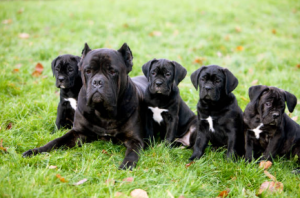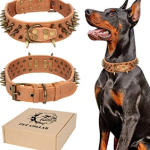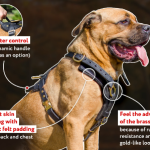Cane Corso Puppies
Introduction
The Cane Corso, also known as the Italian Corso or Italian Mastiff, is a breed that exudes strength, loyalty, and elegance. Originating from Italy, these dogs were historically used as guard dogs, hunting companions, and even war dogs. In recent years, Cane Corso puppies have gained popularity among dog lovers for their imposing presence and gentle nature. This comprehensive guide will delve into every aspect of raising a Cane Corso puppy, from understanding the breed’s history and characteristics to training, health care, and socialization.

Chapter 1: Understanding the Cane Corso
1.1 Historical Background
The Cane Corso has roots that trace back to ancient Rome. They are believed to be descendants of the Roman Molossian dogs, a breed used in battles and as guard dogs. Over the centuries, the Cane Corso evolved and adapted to various roles, including hunting large game and protecting properties. The breed nearly faced extinction but was revived in the 20th century thanks to dedicated enthusiasts.
1.2 Breed Characteristics
The Cane Corso is a large, powerful dog with a muscular build. They are known for their short coat, which can come in various colors including black, gray, fawn, and brindle. Their heads are broad with a distinct stop, and their eyes are expressive and alert. Despite their imposing appearance, Cane Corsos are known for their gentle temperament with families and children.
Chapter 2: Choosing the Right Cane Corso Puppy
2.1 Selecting a Breeder
When choosing a Cane Corso puppy, it is crucial to select a reputable breeder. A good breeder will prioritize the health and well-being of their dogs, conduct necessary health screenings, and provide a clean, nurturing environment. Look for breeders who are members of national breed clubs and who can provide references from previous puppy buyers.
2.2 Evaluating the Litter
Once you find a breeder, evaluating the litter is essential. Observe the puppies’ interactions with their mother and siblings. A well-socialized litter will be curious, friendly, and active. Look for signs of good health, such as clear eyes, clean coats, and a healthy weight.
2.3 Temperament and Socialization
Each Cane Corso puppy has a unique temperament. While the breed is generally known for its loyalty and protective nature, individual puppies can vary. Assess the puppy’s behavior and how they interact with people and other animals. A well-socialized puppy will adapt more easily to new environments and situations.
Chapter 3: Bringing Your Cane Corso Puppy Home
3.1 Preparing Your Home
Before bringing your Cane Corso puppy home, ensure your living space is ready. Create a safe, comfortable area with a bed, food and water bowls, and toys. Remove any potential hazards, such as electrical cords or toxic plants, to ensure a safe environment.
3.2 The First Days
The first few days with your new puppy are crucial for bonding and adjustment. Establish a routine that includes regular feeding times, potty breaks, and playtime. Be patient as your puppy adjusts to their new home and provide plenty of positive reinforcement.
3.3 Socialization and Training
Early socialization is vital for Cane Corso puppies. Expose them to various people, environments, and other animals to help them develop into well-rounded adults. Basic training should start early, focusing on commands such as sit, stay, and come. Positive reinforcement methods work best with this breed.
Chapter 4: Feeding and Nutrition
4.1 Choosing the Right Food
Cane Corso puppies require a balanced diet to support their growth and development. High-quality commercial puppy food that meets the AAFCO (Association of American Feed Control Officials) standards is recommended. Look for foods that list meat as the primary ingredient and avoid those with excessive fillers.
4.2 Feeding Guidelines
Follow the feeding guidelines provided by your puppy’s food manufacturer, but be prepared to adjust based on your puppy’s growth and activity level. Cane Corsos are prone to obesity, so monitor their weight and adjust their food intake as needed.
4.3 Treats and Supplements
Treats should be given in moderation and used as rewards during training. Avoid high-calorie treats that can contribute to weight gain. Consult your veterinarian before introducing any supplements to ensure they are necessary and safe.
Chapter 5: Health and Wellness
5.1 Routine Veterinary Care
Regular veterinary check-ups are essential for maintaining your Cane Corso puppy’s health. Schedule vaccinations, parasite prevention, and dental check-ups as recommended by your vet. Routine blood tests and health screenings can help detect any potential issues early.
5.2 Grooming
While Cane Corsos have a short coat that requires minimal grooming, regular brushing helps reduce shedding and keeps their coat healthy. Check their ears for signs of infection, trim their nails as needed, and maintain dental hygiene through regular brushing.
5.3 Common Health Issues
Cane Corsos are prone to certain health conditions, including hip dysplasia, elbow dysplasia, and bloat. Regular vet visits and maintaining a healthy weight can help manage and prevent these issues. Be aware of any symptoms and seek veterinary care if you notice anything unusual.
Chapter 6: Training and Behavior
6.1 Basic Obedience Training
Basic obedience training is crucial for Cane Corso puppies. Start with simple commands and gradually increase the complexity of the tasks. Consistency and positive reinforcement are key to successful training. Cane Corsos respond well to clear commands and rewards.
6.2 Advanced Training and Socialization
As your puppy matures, advanced training and continued socialization are important. Cane Corsos are intelligent and eager to please, making them suitable for various advanced training activities, including agility and obedience competitions.
6.3 Handling Behavioral Issues
Address behavioral issues early to prevent them from becoming ingrained habits. Common issues in Cane Corsos include dominance and territorial behavior. Professional training or behavior consultation may be necessary for severe issues.
Chapter 7: Exercise and Mental Stimulation
7.1 Daily Exercise Needs
Cane Corsos are active dogs that require regular exercise to stay healthy and happy. Daily walks, playtime, and mental stimulation are essential. They enjoy activities that challenge their physical and mental abilities, such as puzzle toys and agility training.
7.2 Mental Stimulation
In addition to physical exercise, mental stimulation is crucial for Cane Corsos. Interactive toys, training exercises, and problem-solving activities can help keep their minds sharp and prevent boredom.

Chapter 8: Living with a Cane Corso
8.1 Integration into the Family
Cane Corsos are known for their loyalty and protective nature. Integrate them into your family life by including them in family activities and ensuring they have a designated space in the home. They thrive on companionship and interaction.
8.2 Relationship with Children and Other Pets
Cane Corsos are generally good with children and other pets when properly socialized. Supervise interactions between your puppy and young children to ensure safe play. With proper introduction and training, Cane Corsos can coexist harmoniously with other animals.
8.3 Travel and Adaptability
Cane Corsos are adaptable and can travel well if they are accustomed to different environments from a young age. Ensure they are comfortable in various settings and that they have their essential items, such as food and a bed, during travel.
Chapter 9: The Cane Corso Community
9.1 Breed Clubs and Organizations
Joining breed clubs and organizations can provide valuable resources and support for Cane Corso owners. These groups often offer information on breed-specific health concerns, training tips, and opportunities for socializing with other Cane Corso enthusiasts.
9.2 Events and Competitions
Participating in dog shows, obedience trials, and other events can be a rewarding experience for both you and your Cane Corso. These events provide opportunities to showcase your dog’s skills and meet other Cane Corso owners.
9.3 Advocacy and Rescue
Support breed rescue organizations and advocacy groups that work to ensure the well-being of Cane Corsos. Many organizations focus on rescuing and rehoming Cane Corsos in need and can provide additional resources and support for owners.
Conclusion
Raising a Cane Corso puppy is a rewarding experience that requires dedication, patience, and love. By understanding the breed’s history, characteristics, and needs, you can provide the best care for your Cane Corso and build a strong, lasting bond. With proper training, socialization, and health care, your Cane Corso puppy will grow into a loyal and majestic companion, embodying the best qualities of this extraordinary breed.
As you embark on this journey, remember that every Cane Corso is unique, and the love and commitment you invest in their upbringing will be reflected in their happiness and well-being. Enjoy the adventure of raising your Cane Corso puppy and cherish the special moments you will share together.






